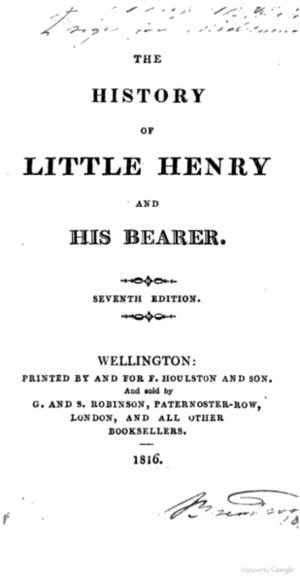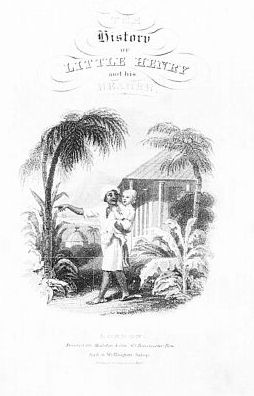The History of Little Henry and his Bearer facts for kids
The History of Little Henry and his Bearer (1814) is a famous children's book written by Mary Martha Sherwood. It was very popular and stayed in print for 70 years after it first came out. The book was translated into many languages, including French, German, Spanish, Hindustani, Chinese, Marathi, Tamil, and Sinhalese.
The story is about a young British boy named Henry. He is cared for by an Indian man named Boosy. At the end of his life, Henry teaches Boosy about Christianity, and Boosy becomes a Christian. The book talks a lot about themes like colonialism (when one country controls another) and evangelicalism (a type of Christian belief focused on spreading the faith).
Book Style and Storytelling
Mary Martha Sherwood's story mixes real-life details with emotional moments. She uses some Hindustani words and describes what she thought was real Indian life. A scholar named M. Nancy Cutt said that this book made stories about Christian conversion more like exciting adventures.
Main Ideas and Messages
In 1823, Sherwood wrote another story called The History of Little Lucy and her Dhaye. This book was similar but not as popular as Little Henry.
In both books, Sherwood shows that the children's close relationships with their Indian caregivers could make it harder for them to feel fully "English." She then suggests that Evangelical Christianity helps solve this problem. This type of Christianity encourages people to spread their faith to others.
Scholar Dara Regaignon explains that in these stories, becoming Christian "saves" Henry and Lucy. It teaches them that some religions and cultures are right, while others are wrong. The children then end up "civilizing" their caregivers.
Sherwood connects being British with being Christian. For example, at the start of Little Henry, Henry only speaks Hindustani. But as he learns English, he also learns Christian teachings. The book suggests that the English language and Christian education are deeply connected. When Henry teaches Boosy to read English, he also helps him become Christian.
Sherwood's stories also aimed to inspire readers to become missionaries. In Little Henry, Henry's death is what makes Boosy decide to become Christian. The last line of the book tells young readers to follow Henry's example: "Little children in India, remember Henry L—, and go and do likewise."
At the time Little Henry was published, Christian evangelicals were gaining power in Britain. A law called the Charter Act of 1813 allowed missionaries to start working in India. The book's message was popular and helped convince many children that spreading Christianity was the right thing to do.
Images for kids





